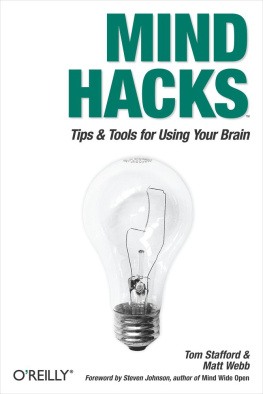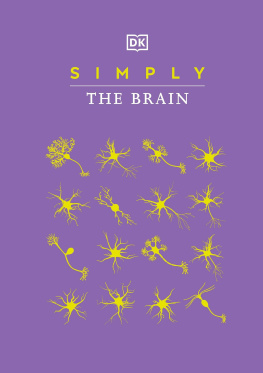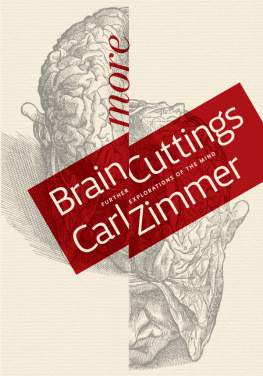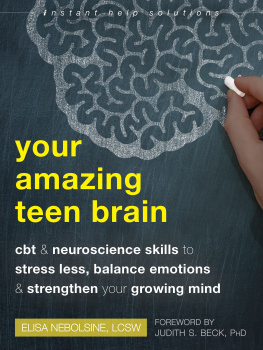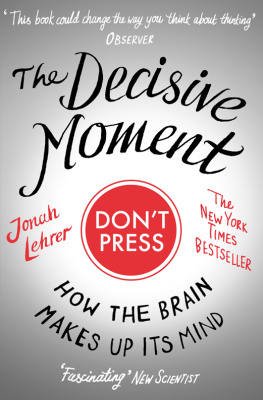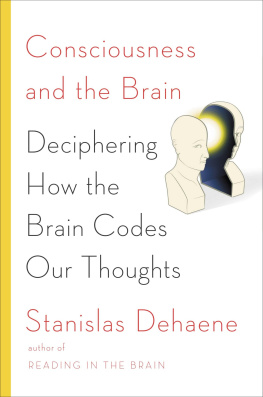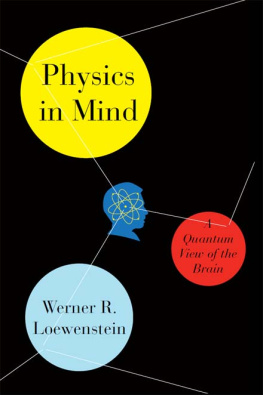Foreword
Few developments in the brain sciences over the past 20 years have been as crucial as the steady eradication of the brain-as-computer metaphor that dominated so much of our thinking about thinking in the 60s and 70s. Partly the metaphor declined because artificial intelligence turned out to be a vastly more complicated affair than we imagined; partly it declined because we developed new tools for understanding and visualizing the biology of the brain, which didnt look like a microprocessor after all; partly it declined because an influential group of scientists began exploring the vital role of emotion in brain function. Its true the brain contains elements that resemble logic gates of digital computing, and some influential researchers continue to describe the activity of mind as a kind of computation. But for the most part, we now accept the premise that computers and brains are two very different things that happen to share some aptitudes: playing chess, say, or correcting spelling.
At first glance, the book youre holding in your hand might be accused of reviving the old brain-as-computer conceit: hacks is a software term, after all, and the previous books in the series have all revolved around digital computing in one form or another. But I think this book belongs instead to a distinctly 21st-century way of thinking about the brain, one we might callin the language of software design user-centric . The wonders of brain science are no longer something we contemplate exclusively in the lab or the lecture hall; we now explore how the brain works by doing experiments on our own heads. You can explore the architecture and design of your brain just by sampling the many exercises included in the following pages. Consciousness exploration is an old story, of courseone of the oldestbut consciousness exploration with empirical science as your guide is a new one. Weve had the age of Freud, of psychedelics, of meditation. This book suggests that a new form of introspection is on the rise, what Ive called, in another context, recreational neuroscience.
I think the idea of a brain hack is a wonderful one, and Matt Webb and Tom Stafford have assembled here a collection of tricks-of-the-mind that will astound you, and give you a new appreciation for the way your brain shapes the reality you perceive. But its worth pointing out a subtle distinction between the software use of the word hack and the way Matt and Tom use it here. In programming, a hack is something we do to an existing tool that gives it some new aptitude that was not part of its original feature set. When we hack a piece of code, we are bending the software to fit our will; were making it do something its original creators never dreamed of.
The mind hacks that will delight and puzzle you in the coming pages largely work in the opposite direction. When you undergo these experiments, what youre sensing is not your brains subservience to your will, but rather its weird autonomy. These hacks amaze because they reveal the brains hidden logic; they shed light on the cheats and shortcuts and latent assumptions our brains make about the world. Most of the time, these mechanisms are invisible to usor so ubiquitous we no longer notice their existence. A brain hack is a way of pulling back the curtain of consciousness to glimpsehowever fleetinglythe machinery on the other side.
This can be a profoundly unsettling experience, precisely because it reveals the way the brain is not always subservient to your will, which very quickly leads you down an existential slide. (Whose will is it anyway?) But its a journey that anyone interested in the mind cannot afford to miss. Our brains have a kind of life of their own, quite apart from what we think we know about ourselves. Thats a scary thought, but being scary doesnt make it any less true. As you read through the coming pages, youll no doubt find yourself alarmed at the strange cognitive behavior you can trigger just by following a simple set of instructions. But I suspect youll also find yourself with a new sense of wonder about the mystery of consciousnessalong with some killer cocktail party tricks.
So that is the inward adventure that lies before you. May it mess with your head in all the right ways.
Steven Johnson Brooklyn, New York
Steven Johnson is the author of Mind Wide Open: Your Brain and the Neuroscience of Everyday Life (Scribner).
Credits
About the Authors
Tom Stafford likes finding things out and writing things down. Several years of doing this in the Department of Psychology at the University of Sheffield resulted in a Ph.D. Now sometimes he tells people hes a computational cognitive neuroscientist and then talks excitedly about neural networks. Lately hes begun talking excitedly about social networks too. As well as doing academic research, he has worked freelance, writing and working at the BBC as a documentary researcher. Things he finds interesting he puts on his web site at http://www.idiolect.org.uk .
Matt Webb is an engineer and designer, splitting his working life between R&D with BBC Radio & Music Interactive and freelance projects in the social software world. In the past, hes made collaborative online toys, written IM bots, and run a fiction web site (archived at

